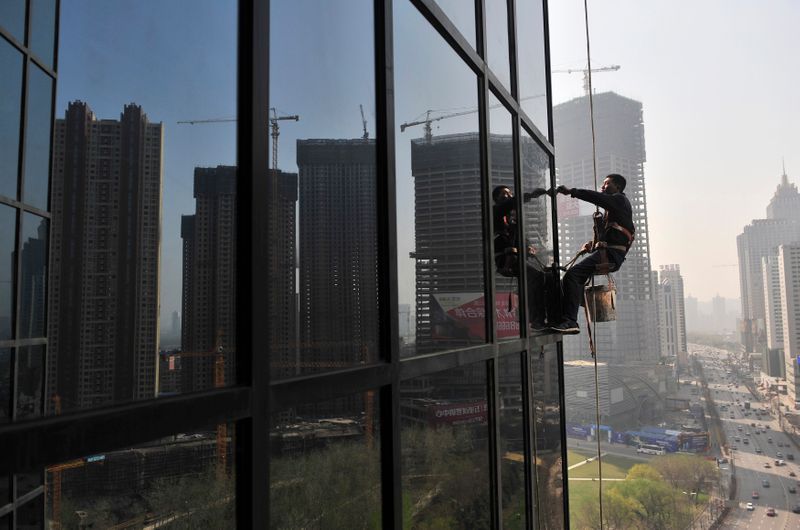
A police officer is seen during as looting and violence erupts on September 02, 2019 in Johannesburg, South Africa. Shops in and around various parts of Johannesburg, were looted and set alight. Most of these establishments are owned by foreign nationals.
Alon Skuy/Sowetan/Gallo Images via Getty Images
LONDON — A year and a half since the South African government adopted an action plan to combat xenophobia, African and Asian foreigners in the country are still suffering routine harassment and abuse, according to Human Rights Watch.
In a 64-page report published earlier this month which contained video footage and witness testimony, the organization claimed that in the year since the implementation of the plan, the government has done “very little to ensure that attacks by members of the public, the police, and government officials are investigated and that those responsible are held accountable.”
HRW documented killings, serious injuries, barriers to justice and basic services, displacement and discrimination over the course of the year. Non-nationals also struggled to secure legal representation or acquire legal status documents enabling access to health care and education.
The South African government and law enforcement authorities have claimed that the violence was driven purely by criminality, and not by xenophobia. A spokesperson for the government did not respond to CNBC’s request for comment, but the government issued a statement in July condemning xenophobic attacks and called for South Africans to desist from unlawful behavior.
“It is unfortunate that such message is intended to sow divisions amongst South Africans and foreign nationals,” the statement added.
Just last week, a social media campaign led to xenophobic protests outside the Nigerian embassy in Pretoria, according to South Africa’s Sunday Times.
The non-profit cited the indifference, denial or tacit approval of government officials and law enforcement authorities as allowing such obstacles to persist.
“Non-South African nationals have suffered wave after wave of xenophobic violence and live in constant fear of being targeted solely for not being South African,” said Kristi Ueda, Africa division fellow at Human Rights Watch and author of the report.
“The South African government should hold those responsible accountable to the fullest extent of the law. Impunity only emboldens others and perpetuates xenophobia.”
Scapegoats
HRW interviewed 51 people across the Western Cape, Gauteng, and KwaZulu-Natal provinces, including two children, along with aggregating media reports and South African legal documents, regulations and judicial decisions.
The report highlighted that foreigners were scapegoated for economic insecurity, crimes, and government failures to deliver services, and were subjected to nationwide protests and shutdowns characterized by mob violence, looting, and torching of their businesses.
Non-nationals were attacked and forcibly displaced by mobs wielding weapons and destroying homes and businesses in September 2019. Although the South African government stated that 10 of the 12 killed in the violence were South Africans, Human Rights Watch has asserted that at least 18 foreigners were killed during the violence.
A refugee from Democratic Republic of Congo told Human Rights Watch: “I was selling clothes on the street when nine South Africans carrying sjamboks and sticks came. They were beating people, shouting ‘You foreigners, go home! We don’t need you here! You are taking our jobs and money!’ I started to run away, but I was beaten, and my two bags of clothes were taken.”
‘Abusive raids’
Police raids to crack down on counterfeit goods have also targeted foreign-run businesses, with shops ransacked and destroyed and rubber bullets fired into crowds by police, according to HRW.
The report also alleges that the Department of Home Affairs and the police carried out “abusive documentation raids,” in some cases denying detained foreigners court hearings or failing to bring them before a judge within the required time period. HRW researchers found that officials have “frequently claimed to have lost or misplaced the arrested people’s documents or other possessions,” according to the report.
On Jan. 14, Aaron Motsoaledi, health minister at the time and now minister of home affairs, reportedly insisted: “We are not xenophobic as a department and as a country.”
All interviewees reportedly expressed frustration with the process of obtaining or renewing legal status documents, particularly with regards to the Section 22 asylum seeker permit, and still often find it rejected by banks and hospitals.
“Launching the National Action Plan was a positive step, but clearly more urgent, concrete measures are needed, particularly to end violence, police harassment, and impunity,” HRW’s Ueda said.
“Protecting non-nationals from further attacks and ending impunity for xenophobic violence requires a long-term strategy and not just words on paper.”

